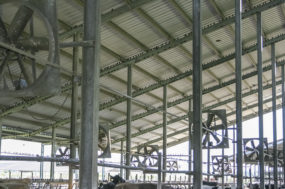The first question I usually ask a dairyman about his generator is: Who has done the maintenance in the past? They usually respond with, “I have a farm mechanic that is supposed to look after it, but he doesn’t know anything about generators and feels intimidated.
I also have an electrician that doesn’t know anything about engines and is intimidated to work on the generator.”
This is very common in my industry. That’s where the generator technician comes in. Our industry is fairly unique. We have been through extensive training in both the electrical and the engine side of the equipment. We know how the generator functions and how to efficiently troubleshoot and repair any issues which may arise.
The second question I generally ask is: When was the last time you ran your generator? The response usually is, “It ran well a few months ago,” or “It worked the last time I needed it,” which is usually followed by “the last time the power was out” – and that may have been a month or a year prior.
Most generator maintenance companies will service all makes and models. Ask around and find a reputable generator maintenance and repair company in your area and have them come out and inspect your generator on a regular basis. It doesn’t matter what make it is; generator technicians are trained to fix most makes and models or have resources available to get you up and running.
The most important thing to remember is: Your generator may sit for months at a time without use and may need to be used at a moment’s notice. It is a good practice to run the unit regularly and make sure it is producing the correct voltage and the engine is functioning properly.
I recommend having it inspected at least twice a year, once during the hot months and once when it cools off.
Temperature swings can affect the way your generator performs if it is not properly maintained. For example, hot months are when batteries are more likely to fail, and cold months are when hoses are most likely to shrink and create coolant leaks, and block heaters start malfunctioning.
When we are scheduled to come out to your site, we will check all of these things as part of a comprehensive inspection process and catch small problems before they become big problems, which saves you money in the long run.
Remember, we are covering not only maintenance on the engine but also the alternator and control systems, the battery-charging system and block heater to ensure your generator functions properly when needed at a moment’s notice.
Your operation can continue producing milk, and your most prized commodities will be protected when Mother Nature takes her toll or the neighbor hits a power pole. Custom maintenance programs are always available to suit your needs and are affordable.
I understand how important your dairy cows are to your operation and how passionate you are about them. Dairy cows require specific and specialized care; so does the equipment you use on the farm, whether you use it several times a day or only in emergencies.
Generator technicians are just as passionate about the generators we take care of. We know how important they are to your business.
I spoke with a dairyman recently who called up to say thanks for making sure his generator was functioning and reliable. He was thankful he didn’t have to stress about it because he had someone taking care of it. He recounted to me that he had a friend in the Texas Panhandle who recently had issues with some of his cows.
They had a 48-hour power outage during a winter storm, and his generator stopped functioning. His friend said he wasn’t the only one in that predicament either. He said some of the cows’ teats froze, and others got very sick. Not only were they unable to produce milk, but the health of their cows was put in jeopardy.
The cost of maintenance is very minimal in the grand scheme of things. It is just like changing the oil on your car and following the other manufacturers’ suggested maintenance intervals. You may even want to change the oil yourself.
On the other hand, when it comes to something like changing the timing belt on your car or testing the windings on your generator and checking the valve lash on the engine, you may not feel comfortable doing it yourself – so take it to a mechanic.
Just remember, luck is when preparation meets opportunity. If you’re prepared when the lights go out, you’ll be calling and thanking us when your generator does the job you bought it for, instead of calling in for repairs. A little regular maintenance now will go a long way when the time comes to use your generator. ![]()
Joshua Greer is with Western States Equipment Co.





